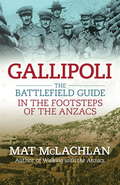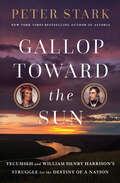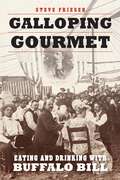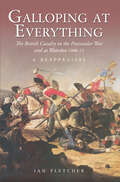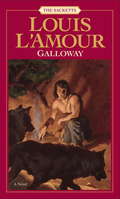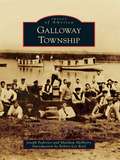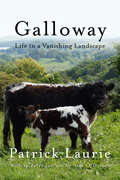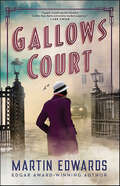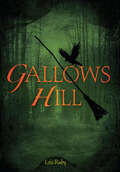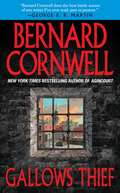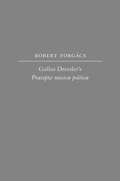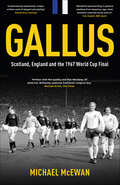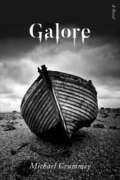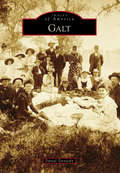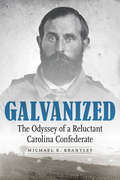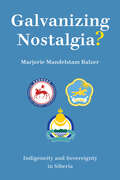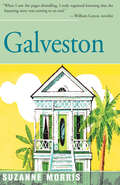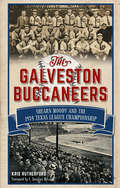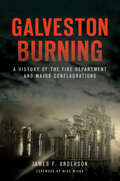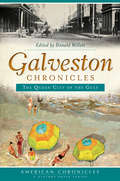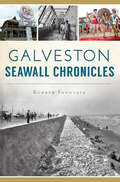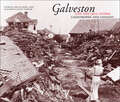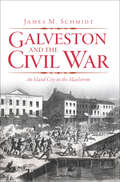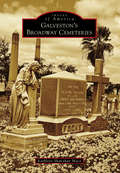- Table View
- List View
Gallipoli: The battlefield guide
by Mat MclachlanThe essential travel companion for anyone visiting Gallipoli.Each year, thousands of Australians visit Gallipoli to pay homage and see where their forebears fought, suffered and died. Anzac Cove, Quinn's Post, Lone Pine - the iconic places where our national legend was forged.In this essential and authoritative guide, practical information is combined with historical detail, alongside revealing and often heartrending quotes from the letters and diaries of the Anzacs themselves.- Detailed easy-to-follow plans for walking and driving tours across the main battlefields- Maps, photos and historical commentary to put the campaign in context- Everything you need to know where to go, where to stay and how to get there.Walk where the Anzacs walked, see where they fought and marvel at their courage.
Gallop Toward the Sun: Tecumseh and William Henry Harrison's Struggle for the Destiny of a Nation
by Peter StarkA vivid account of the rivalry between future president William Henry Harrison and the Shawnee chief Tecumseh—and of the Native American alliance that fought westward expansion—from the New York Times bestselling author of Astoria&“Taut, multi-layered . . . a much-needed reevaluation of this crucial period of our nation&’s history.&”—Laurence Bergreen, author of Over the Edge of the WorldThe conquest of Indigenous land in the eastern United States through corrupt treaties and genocidal violence laid the groundwork for the conquest of the American West. In Gallop Toward the Sun, acclaimed author Peter Stark exposes the fundamental conflicts at play through the little-known but consequential struggle between two extraordinary leaders.William Henry Harrison was born to a prominent Virginia family, the son of a signer of the Declaration of Independence. He journeyed west, became governor of the vast Indiana Territory, and sought statehood by attracting settlers and imposing one-sided treaties.Tecumseh, by all accounts one of the nineteenth century&’s greatest leaders, belonged to an honored line of Shawnee warriors and chiefs. His father, killed while fighting the Virginians flooding into Kentucky, extracted a promise from his sons to &“never give in&” to the land-hungry Americans. An eloquent speaker, Tecumseh traveled from Minnesota to Florida and west to the Great Plains convincing far-flung tribes to join a great confederacy and face down their common enemy. Eager to stop U.S. expansion, the British backed Tecumseh&’s confederacy in a series of battles during the forgotten western front of the War of 1812 that would determine control over the North American continent.Tecumseh&’s brave stand was likely the last chance to protect Indigenous people from U.S. expansion—and prevent the upstart United States from becoming a world power. In this fast-paced narrative—with its sharply drawn characters, high-stakes diplomacy, and bloody battles—Peter Stark brings this pivotal moment to life.
Galloping Gourmet: Eating and Drinking with Buffalo Bill
by Steve FriesenGalloping Gourmet explores an unfamiliar side of a familiar character in American history, William F. &“Buffalo Bill&” Cody. In this entertaining narrative Steve Friesen explores the evolving role of eating and drinking in Buffalo Bill&’s life (1846–1917). Friesen starts with Buffalo Bill&’s culinary roots on the American Plains, eating simple foods such as cornbread, fried &“yellow-legged&” chicken, and hardtack. Buffalo Bill discovered gourmet dining while leading buffalo-hunting expeditions and scouting. As his fame increased, so did his desire and opportunities for fine dining: his early show business career allowed him to dine at some of the best restaurants in the country. Friesen examines the creation of Buffalo Bill&’s Wild West Show in 1883, in which Cody introduced his diverse cast of employees to dining that equaled America&’s best restaurants. One newspaper reporter observed that &“Colonel Cody displays no more care about anything than the proper feeding of horse and man.&” Cody opened the first Mexican restaurant east of the Mississippi and introduced American foodways to Europe. Equally comfortable eating around a campfire on the plains or at Delmonico&’s in New York City, he also dined with leading celebrities of his day. In the final section Friesen addresses the controversies surrounding Cody&’s drinking, his death, and his ongoing culinary legacy. Galloping Gourmet includes an appendix of more than thirty annotated period recipes.
Galloping at Everything
by Ian FletcherThe poor discipline demonstrated by the British cavalry commanded by general Slade at Maguilla in 1812 prompted the Duke of Wellington's famous remark that British cavalry officers were in the habit of galloping at everything. This work rehabilitates the reputation of the British cavalry in the Peninsula and at Waterloo.
Galloway
by Louis L'AmourGALLOWAY In Galloway, Louis L’Amour tells the story of two brothers who must struggle to survive in a wild and beautiful land to build themselves a ranch and a future.Trouble was following Flagan Sackett with a vengeance. Captured and tortured by a band of Apaches, he escaped into the rugged San Juan country, where he managed to stay alive until his brother Galloway could find him. But the brothers were about to encounter worse trouble ahead. Their plan to establish a ranch angered the Dunn clan, who had decided that the vast range would be theirs alone. Now Galloway and Flagan would face an enemy who killed for sport—but as long as other Sacketts lived, they would not fight alone.From the Paperback edition.
Galloway
by Louis L'AmourGALLOWAY In Galloway, Louis L'Amour tells the story of two brothers who must struggle to survive in a wild and beautiful land to build themselves a ranch and a future. Trouble was following Flagan Sackett with a vengeance. Captured and tortured by a band of Apaches, he escaped into the rugged San Juan country, where he managed to stay alive until his brother Galloway could find him. But the brothers were about to encounter worse trouble ahead. Their plan to establish a ranch angered the Dunn clan, who had decided that the vast range would be theirs alone. Now Galloway and Flagan would face an enemy who killed for sport--but as long as other Sacketts lived, they would not fight alone.From the Paperback edition.
Galloway Township
by Joseph Federico Matthew Mchenry Robert Lee ReidGalloway Township, founded in 1774 by the royal patent of King George III, is the largest municipality in New Jersey, encompassing the Absecon Highlands, Cologne, Conovertown, Germania, Higbeetown, Leeds Point, Oceanville, Pinehurst, Pomona, Smithville, and South Egg Harbor. Galloway has experienced everything from pirates to Prohibition. The Battle of Chestnut Neck occurred in Galloway in 1778 during the American Revolution. Along the way, the township has become home to Historic Smithville and Village Greene, the Seaview Resort, and the Noyes Museum of Art and has become the supposed birthplace of the fabled "Jersey Devil."
Galloway: Life In a Vanishing Landscape
by Patrick LaurieOn the land of his ancestors in Scotland, a young farmer struggles to find a balance between farming, the conservation of wild, and human culture as he establishes a herd of heritage cattle.Galloway, an ancient region in an obscure corner of Scotland, has a proud and unique heritage based on hardy cattle and wide moors. But as the twentieth century progressed, the people of Galloway deserted the land and the moors are transforming into a vast commercial forest. Desperate to connect with his native land, Patrick Laurie plunges into work on his family farm. Investing in the oldest and most traditional breeds of Galloway cattle, he begins to discover how cows—and the special care that this breed requires—once shaped people, places, and nature in this remote and half-hidden place. As the cattle begin to dictate the pattern of his life, Laurie stumbles upon another loss; the new forests have driven the catastrophic decline of the much-loved curlew, a bird that features strongly in Galloway's consciousness. The links between people, cattle, and wild birds become a central theme as Laurie begins to face the reality of life in a vanishing landscape. Exploring the delicate balance between farming and conservation while recounting an extraordinarily powerful personal story, Galloway delves into the relationship between people and places under pressure in the modern world.
Gallows Court (Rachel Savernake Golden Age Mysteries #1)
by Martin Edwards"Superb—a pitch-perfect blend of Golden Age charm and sinister modern suspense, with a main character to die for. This is the book Edwards was born to write."—Lee Child, #1 New York Times bestselling authorThe first Golden Age-style mystery in the Rachel Savernake series… How close can one person get to a cruel justice system before falling victim to it?London, 1930Sooty, sulphurous, and malign: no woman should be out on a night like this. A spate of violent deaths—the details too foul to print—has horrified the capital and the smog-bound streets are deserted. But Rachel Savernake—the enigmatic daughter of a notorious hanging judge—is no ordinary woman. To Scotland Yard's embarrassment, she solved the Chorus Girl Murder, and now she's on the trail of another killer.Jacob Flint, a young newspaperman temporarily manning The Clarion's crime desk, is looking for the scoop that will make his name. He's certain there is more to the Miss Savernake's amateur sleuthing than meets the eye. He's not the only one.Flint's pursuit of Rachel Savernake will draw him ever-deeper into a labyrinth of deception and corruption. Murder-by-murder, he'll be swept ever-closer to its dark heart—and to the gallows themselves.Dark, atmospheric, and hearkening back to the Golden Age mysteries, Gallows Court is:Perfect for fans of Sherry Thomas and Sophie HannahFor readers who enjoy British crime mysteries and historical fiction
Gallows Hill
by Lois RubySalem, Massachusetts - 1692 Thomas is marked as an outcast the moment he steps off the ship from England. As a Quaker, he’s outnumbered and distrusted by Salem’s Puritans. And as an orphan without any useful skills, he has nowhere to live and no way to earn his keep. In a stroke of luck—perhaps good, perhaps not—he’s taken in by the aged widow Prudence Blevins, who’s rumored to be a witch. Patience has tried all her life to be a good Puritan—obedient to God and to her elders—and all her life, she has come up short. But her orderly world is upended when her younger sister, Abigail, falls victim to a mysterious affliction. The same torments have stricken other Salem girls, who claim they’re being bewitched by servants of the Devil. Soon the girls, including Abigail, begin accusing neighbors of witchcraft. As the community becomes consumed by suspicion and fear, Thomas and Patience search for the truth. To protect those they care about, they will have to question everything they think they know: their faiths, their loyalties, and their places in Salem.
Gallows Thief
by Bernard CornwellThe year is 1820. Rider Sandman, a hero of Waterloo, returns to London to wed his fiancée. But instead of settling down to fame and glory, he finds himself penniless in a country where high unemployment and social unrest rage, and where men--innocent or guilty--are hanged for the merest of crimes.When he's offered a job as private investigator to re-open the case of a painter due to be hanged for a murder he didn't commit, Sandman readily accepts--as much for the money as for a chance to see justice done in a country gone to ruins.Soon, however, he's mired in a grisly murder plot that keeps thickening. Sandman makes his way through gentlemen's clubs and shady taverns, aristocratic mansions, and fashionable painters' studios determined to rescue the innocent young man from the rope. But someone doesn't want the truth revealed.
Gallus Dressler's Praecepta musicae poeticae (Studies in the History of Music Theory and Literature)
by Gallus DresslerNow available for the first time in English translation, this new edition of Gallus Dressler's Praecepta musicae poeticae corrects and expands upon earlier editions of one of the most important sixteenth-century treatments of musical theory and rhetoric. Robert Forgács’ detailed study of the Latin text reveals significant and original insights into the invention of fugues and the composition of opening, middle, and concluding sections. Forgács introduces the reader to Dressler's life and work and the design and sources of Praecepta musicae poeticae, places the treatise more fully in its humanist environment, presents additional classical sources for the text, and relates it to the work of Dressler’s contemporary music theorists. Copious annotations and indexes of words, names, and subjects place the treatise within the broader context of German theoretical discussion, the teaching and practice of music in the sixteenth century, and the musical life of the Lutheran Church.
Gallus: Scotland, England and the 1967 World Cup Final
by Michael McEwanThere are two kinds of people in this world. Those who insist that football is just a game, and those who know better. Take the April 1967 clash between England and Scotland. Wounded by their biggest rivals winning the World Cup just nine months earlier, Bobby Brown's Scots travelled to Wembley on the mother of all missions. Win and they would take a huge step towards qualifying for the 1968 European Championship, end England’s formidable 19-game unbeaten streak, and, best of all, put Sir Alf Ramsey’s men firmly back in their box. Lose? Well, that was just unthinkable. Meanwhile, off the pitch, the winds of change were billowing through Scotland. Nationalism, long confined to the margins of British politics, was starting to penetrate the mainstream, gaining both traction and influence. Was England’s World Cup victory a defining moment in the Scottish independence movement? Or did it consign Scotland to successive generations of myopic underachievement? Michael McEwan, author of The Ghosts of Cathkin Park, returns to 1967 to explore a crucial ninety minutes in the rebirth of a nation.
Galore
by Michael CrummeyWinner of the Commonwealth Writers' Prize for Best Book, Caribbean & Canada and the Canadian Authors Association Literary Award; Finalist for the Governor General's Literary Award for Fiction, the Thomas Head Raddall Atlantic Book Award, and the Winterset AwardWhen a whale beaches itself on the shore of the remote coastal town of Paradise Deep, the last thing any of the townspeople expect to find inside it is a man, silent and reeking of fish, but remarkably alive. The discovery of this mysterious person, soon christened Judah, sets the town scrambling for answers as its most prominent citizens weigh in on whether he is man or beast, blessing or curse, miracle or demon.Though Judah is a shocking addition, the town of Paradise Deep is already full of unusual characters. King-me Sellers, self-appointed patriarch, has it in for an inscrutable woman known only as Devine's Widow, with whom he has a decades-old feud. Her granddaughter, Mary Tryphena, is just a child when Judah washes ashore, but finds herself tied to him all her life in ways she never expects. Galore is the story of the saga that develops between these families, full of bitterness and love, spanning two centuries.With Paradise Deep, award-winning novelist Michael Crummey imagines a realm where the line between the everyday and the otherworldly is impossible to discern. Sprawling and intimate, stark and fantastical, Galore is a novel about the power of stories to shape and sustain us.
Galt (Images of America)
by Daniel TarnaskyNew York native Dr. Obed Harvey came to California to seek his fortune in the Gold Rush. Like so many others, he turned to farming the great Central Valley. With the help of the Central Pacific Railroad, Dr. Harvey established a town around the railroad that ran through his property. His friend John McFarland, a rancher, chose the name Galt after his boyhood home in Canada. Over the years, unique businesses like the Sego Milk Plant and the Galt Winery came and went. The citizens celebrated the Fourth of July with parades and attended the Sacramento County Fair, held in town. Still a farming community with a small-town atmosphere, Galt is noted for Spaans Cookie Co., McFarland Living History Ranch, and the Rae House Museum.
Galvanized: The Odyssey of a Reluctant Carolina Confederate
by Michael K. BrantleyEvery Civil War veteran had a story to tell. But few stories top the one lived by Wright Stephen Batchelor. Like most North Carolina farmers, Batchelor eschewed slaveholding. He also opposed secession and war, yet he fought on both sides of the conflict. During his time in each uniform, Batchelor barely avoided death at the Battle of Gettysburg, was captured twice, and survived one of the war&’s most infamous prisoner-of-war camps. He escaped and, after walking hundreds of miles, rejoined his comrades at Petersburg, Virginia, just as the Union siege there began. Once the war ended, Batchelor returned on foot to his farm, where he took part in local politics, supported rights for freedmen, and was fatally involved in a bizarre hometown murder. Michael K. Brantley&’s story of his great-great-grandfather&’s odyssey blends memory and Civil War history to look at how the complexities of loyalty and personal belief governed one man&’s actions—and still influence the ways Americans think about the conflict today.
Galvanizing Nostalgia?: Indigeneity and Sovereignty in Siberia
by Marjorie Mandelstam BalzerGalvanizing Nostalgia? explores critical questions for the survival of Russia in its nominally federal form. Will Russia fall apart along the lines of its internal republics, as did the Soviet Union? Based on cultural anthropology field and historical research in major republics of Eastern Siberia—Sakha (Yakutia), Buryatia, and Tyva (Tuva)—this book highlights Indigenous concerns about self-determination.Marjorie Mandelstam Balzer suggests that a fragile and disorganized dynamic of nested sovereignties has developed within Russia. Ecology activism has grown, given new threats to the environment and accelerating climate challenges, especially in the Arctic. Focus on strategically chosen republics enables comparing and contrasting interethnic relations, language politics, and the salience of gender, demography, resource competition, environmental degradation, and increased spirituality. Republics vary in their neocolonial relationships to Moscow authorities. Some local leaders, such as a politicized shaman, use nostalgia for cultural achievements to galvanize citizens. Since the Soviet Union collapsed, cultural and political revitalization have been relatively more viable, although still difficult, in areas where Siberians have their own republics.
Galveston
by Suzanne MorrisA powerful and absorbing story of three women whose lives shaped--and were inevitably shaped by--the success and failure of a city; a story that strangely parallels the intriguing history of this island of lost dreams.
Galveston Buccaneers, The: Shearn Moody and the 1934 Texas League Championship (Sports)
by Kris Rutherford E. Douglas McleodGalveston survived the Great Depression with a healthy dose of baseball, boll weevils and bootleg business. Farmers like future Galveston Buccaneers star Buck Fausett fled the insect infestation of North Texas for the city's sunny shores along with throngs of visitors eager to visit Sam Maceo's clubs and catch a ballgame. Galvestonians had a long love affair with America's favorite pastime, fielding the first game played in the state. Cotton heir Shearn Moody purchased the Buccaneers in 1931 and turned the languishing squad into a dominating force that won the 1934 Texas League Championship. Author Kris Rutherford weaves a captivating history of the Moody family, a team of talented players and the island that claimed them.
Galveston Burning: A History of the Fire Department and Major Conflagrations (Disaster)
by James F. AndersonSince 1821, when Jean Lafitte sailed away from a burning Campeche, the history of Galveston has often been wreathed in smoke. Over the next century, one inferno breached the walls of Moro Castle, while another reduced forty-two blocks of the residential district to ash. Recognizing the importance of protecting the city, concerted efforts were made to establish the first paid fire department, create a city waterworks and regulate construction standards. Yet even with all the forethought and planning, rogue fires continued to consume architectural gems like Nicholas Clayton's Electric Pavilion. Author James F. Anderson explores the lessons that Galveston has learned from its fiery past in order to safeguard its future.
Galveston Chronicles: The Queen City of the Gulf
by Donald WillettNamed for Bernardo de Galvez and established in 1839, Galveston measures just over two hundred square miles. In early Texas history, however, it was actually the largest city in the Lone Star State, as well as a hugely important port that would become a strategic target during the Civil War. The Oleander City survived the depredations of war and flourished, a resilience it would also display in the wake of the devastating hurricane of 1900. From early cannibals and pirates to the woman suffrage movement and Nazi POWs, Galveston's amazing story continues to evolve today. Join thirteen of Texas's most noted scholars and historians as they share this remarkable island history.
Galveston Seawall Chronicles (Landmarks)
by Kimber FountainAlong Galveston's Gulf Coast runs a seventeen-foot-high, ten-mile-long protective barrier--a response to the nation's all-time deadliest natural disaster. The seawall remains a stoic protector more than a century later, shielding the island from much more than physical destruction. As the foundation of Seawall Boulevard, this structure created an entirely new tourism industry that buoyed the city's economy through war, the Great Depression and hurricanes. Adapting to the cultural trends and political movements that defined the past century, the seawall represents the unbreakable spirit of Galveston's resilient population and provides a fascinating glimpse into bygone times.
Galveston and the 1900 Storm: Catastrophe and Catalyst
by Patricia Bellis Bixel Elizabeth Hayes TurnerSpur Award Nominee: How Galveston, Texas, reinvented itself after historic disaster: “A riveting narrative . . . Absorbing [and] well-illustrated.” —Library JournalThe Galveston storm of 1900 reduced a cosmopolitan and economically vibrant city to a wreckage-strewn wasteland where survivors struggled without shelter, power, potable water, or even the means to summon help. At least 6,000 of the city's 38,000 residents died in the hurricane. Many observers predicted that Galveston would never recover and urged that the island be abandoned. Instead, the citizens of Galveston seized the opportunity, not just to rebuild, but to reinvent the city in a thoughtful, intentional way that reformed its government, gave women a larger role in its public life, and made it less vulnerable to future storms and flooding.This extensively illustrated history tells the full story of the 1900 Storm and its long-term effects. The authors draw on survivors’ accounts to vividly recreate the storm and its aftermath. They describe the work of local relief agencies, aided by Clara Barton and the American Red Cross, and show how their short-term efforts grew into lasting reforms. At the same time, the authors reveal that not all Galvestonians benefited from the city’s rebirth, as African Americans found themselves increasingly shut out from civic participation by Jim Crow segregation laws. As the centennial of the 1900 Storm prompts remembrance and reassessment, this complete account will be essential and fascinating reading for all who seek to understand Galveston’s destruction and rebirth.Runner-up, Spur Award for Best Western Nonfiction—Contemporary, Western Writers Of America
Galveston and the Civil War: An Island City in the Maelstrom (Civil War Ser.)
by James M SchmidtOne of the oldest cities in Texas, Galveston has witnessed more than its share of tragedies. Devastating hurricanes, yellow fever epidemics, fires, a major Civil War battle and more cast a dark shroud on the city's legacy. Ghostly tales creep throughout the history of famous tourist attractions and historical homes. The altruistic spirit of a schoolteacher who heroically pulled victims from the floodwaters during the great hurricane of 1900 roams the Strand. The ghosts of Civil War soldiers march up and down the stairs at night and pace in front of the antebellum Rogers Building. The spirit of an unlucky man decapitated by an oncoming train haunts the railroad museum, moving objects and crying in the night. Kathleen Shanahan Maca explores these and other haunted tales from the Oleander City.
Galveston's Broadway Cemeteries
by Kathleen Shanahan MacaBeginning in 1839 with the donation of four square blocks of land, the grouping of cemeteries on the central boulevard of Galveston has grown to include seven separate cemeteries within their gates. Listed in the National Register of Historic Places, it is the resting place of famous and infamous citizens from Galveston's colorful past, including veterans from every war between 1812 and the present, heroes, scoundrels, philanthropists, murderers, pioneers of the Republic of Texas, groundbreaking scientists, and working-class citizens from around the world. Due to several grade raisings, there are up to three layers of burials within the cemetery, with some of the markers being lost forever. The stories of some of the "residents" are gathered here for you to enjoy.
